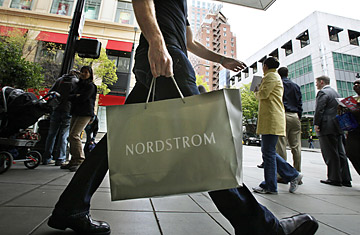
A shopper walks through downtown Seattle.
(2 of 2)
What else can brands do combat this recession?
They can play off something I call instant justification. When the buyer from the family goes out and buys this Louis Vuitton bag, it's actually hard to remove the guilt factor when she's in the store. She now has to come home and justify to her husband why she bought this during a recession. And when you look at the curve of guilt, the biggest spike is maybe seconds after you bought that bag, because the only thing you are thinking about is how to justify the purchase. So what brands are doing now is basically filling a prepackaged justification argument. With women, brands now are basically saying there's one side which is the emotional side, that is, "I love it, I can't live without it, I'll look sexy and popular and whatever." On the other side, they are providing rational arguments to hand over to the husband when they come home. When the husband sees this bag and says, "What the heck are you thinking about?" she will immediately start this argument, saying "Well, I'm not going to buy another bag for four years." Now that's not going to be the truth. But that's what the woman believes in that moment.
If you turn this around, it's exactly the same thing happening with the husband. Around 60% of all car purchases today are decided by the woman in the family. And when a neighbor asks the husband why he bought the car, he cannot say, "My wife loved the pink interior design in my car." That's basically saying, "I'm totally controlled by the woman at home." So what he's going to say is, "Did you know this window can close at 82 m.p.h.? It's the fastest-closing window in the world." And the neighbor will say, "That's kind of cool." Well, it has nothing to do with the functionality of the car, but that's a rational argument he will make. The car company is phrasing it in his mind so he can justify the purchase. (See 10 things to buy during the recession.)
If I'm a consumer who doesn't want to fall into temptation, but I see all these deals out there, what kind of mind games can I play to stop myself from spending money I really need?
Number one: don't bring your credit card out to the mall. When you buy something with cash, it feels like it's much more expensive. And because of that, you actually start to say to yourself, "Hey, is this really worth it?" That's trick number one. Trick number two is related to dopamine and addiction. Take a distance to things. If you go out and you want to buy the bag, the golden rule should be to say, "Hey, I really want that bag, but I'm not going to buy it today, I'm going to wait one day and if I really love it so much I'll come back and buy it." Now we do know from our research studies that 60% of consumers will not buy the car or the bag the day after, simply because the dopamine is falling down to a level where you can't justify going back to the store.
The third element is pretty simple too. If you have a family, leave your kids at home when you shop. We know today that people spend 40% more in a supermarket when their kids are with them. The psychology is very interesting. When the recession is running at its peak, the last group in the world you as a parent want to penalize is the kids. You will say to yourself, "I'm in a recession right now, I can cope with it, that's fine, but my kids should never suffer for me." When you finally go out in the supermarket, you as a parent are much more likely to give in, and basically say "You can buy" because you feel guilty. Kids are very aware of this. I'm in Thailand here, just doing some sessions here today with kids, and the argument Thai kids are using is exactly the same as American kids', as Japanese kids'. They are really playing on the guilt to make sure they can make the parents buy more. They know what buttons to press.
What areas of the brain are you looking at for more insight about how consumers think?
I find it incredibly sad, but let me explain my whole theory of the amygdala. The amygdala is the part of the brain partly responsible for fear. During the recession fear is really growing to immensely higher levels. Advertising in the United States will start to push the fear button. Amygdala activation will grow more in the future, and we will see more and more brands which appeal to the fear factor. They say, "Use my product and if you don't use it, some bad stuff will happen." That's one trend I find scary.
